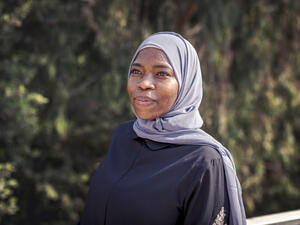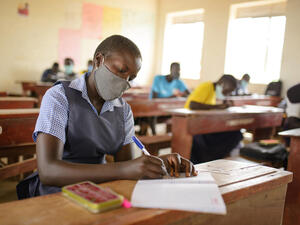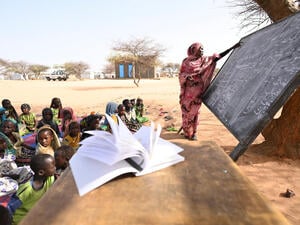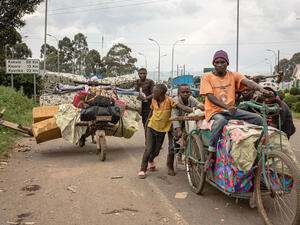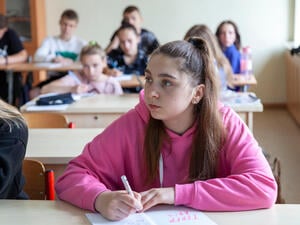School project benefits Afghan refugees and hosts in Balochistan
School project benefits Afghan refugees and hosts in Balochistan

Young Afghan and Pakistani students in a new classroom at Pashtoon Bagh.
QUETTA, Pakistan, June 3 (UNHCR) - Muhammad Ashraf sits on a faded wooden chair and looks contentedly at a recently refurbished and expanded secondary school, which consisted of just one classroom for primary students when he set it up in 1984.
"The school was an excellent picture of negligence," noted Ashraf, who has years of experience as a teacher and now plays a part-time management role for state schools in Quetta. Things looked up when UNHCR stepped in last year and renovated the facility under a project benefitting needy Afghan refugees and their host communities.
The boys' school that Ashraf established in Pashtoon Bagh, a suburb of the southern Pakistani city of Quetta, now has eight classrooms and a big playground.
It is one of 16 state schools that UNHCR has rehabilitated with Save the Children (US) in Pakistan's Balochistan province under the United Nations' Refugee Affected and Hosting Area (RAHA) initiative, which aims to promote peaceful coexistence and good relations between the two communities.
They all needed infrastructure repair or lacked basic supplies. As well as the renovation of old buildings and the construction of new ones, the work at Pashtoon Bagh included the installation of water, sanitation, health and hygiene facilities.
All of the schools that UNHCR has renovated and upgraded are located in deprived areas where Afghan refugees live side by side with the local population. "We don't refuse any child approaching us for admission, be they Pakistani or Afghan," Ashraf stressed.
The veteran educator said standards at schools in the Quetta area had suffered because there were not enough classrooms and teachers and that's why education projects conducted under the RAHA umbrella were so important.
After years of neglect, things are definitely looking up at the refurbished Pashtoon Bagh school. "Our children received a pleasant surprise when they returned to school after the long winter break and saw a clean, beautifully painted and renovated school," Saadullah, the headmaster, told UNHCR visitors.
This was confirmed by a 14-year-old Pakistani student, Sardar Khan, who said that when he returned to school after the break, "I thought I'd come to the wrong place."
More than half of the pupils at Pashtoon Bagh are Afghan refugees, most of whose families live in deprived areas of Quetta and cannot afford to send their boys to private schools. Their Pakistani neighbours face similar problems. Many of their children don't finish their education, dropping out of school so that they can help their families by finding non-skilled work in shops, garages and the like.
The situation is exacerbated by the fact that many of the schools are in a dilapidated state. "To attract students and convince parents to send their children to schools, it is important to make them more student-friendly places," said Fahim Anwar, a teacher at Pashtoon Bagh for the past 12 years. He said a nice playground, better academic facilities and beautifully decorated and furnished classrooms could make all the difference.
This seems to be supported by the figures. Anwar said the number of students at Pashtoon Bagh has increased and called on the United Nations and other organizations to continue supporting the understaffed and overcrowded schools in Quetta by constructing more classrooms and providing school supplies.
Mengesha Kebede, UNHCR representative in Islamabad, recognizes that the international community needs to continue to support projects, like RAHA, that promote coexistence between the Afghan and Pakistani communities.
"Pakistan is a remarkable example of humanitarian coexistence between the refugee and their host communities. Being host to the world's largest refugee community for decades, refugees and locals have shared resources and services that require our and international communities attention for rehabilitation or improvement to serve both communities," he said.
The five-year RAHA programme was launched in 2009 with the support of the Pakistan government. To date, some 74 schools have been rehabilitated under RAHA, including the 16 that UNHCR and Save the Children have completed in Balochistan. The RAHA initiative is expected to benefit 2.5 million Afghan refugees and Pakistanis. Most of its programmes are being implemented in Balochistan and Khyber Pakhtonkwa provinces.
By Duniya Aslam Khan in Quetta, Pakistan

